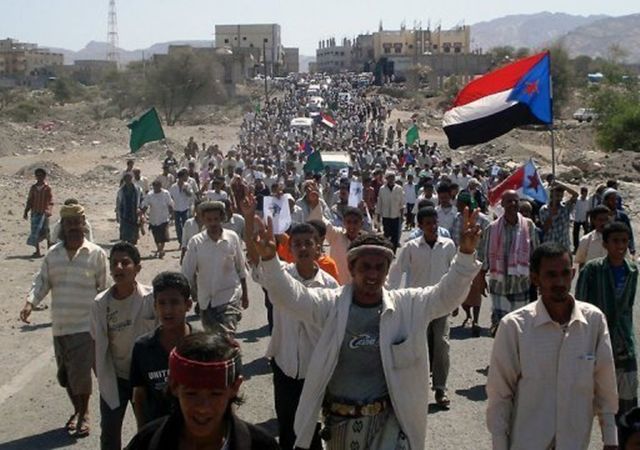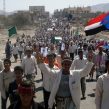
Is Yemen Contemplating a Military Offensive in the Secessionist South?
Publication: Terrorism Monitor Volume: 8 Issue: 25

The secessionist movement in southern Yemen has become increasingly violent in recent months and has gained considerable momentum since it first attained a loose organizational structure in 2007. The prospect of a renewed civil war ensuing between southern forces and the central government in Sana’a, Yemen’s capital, seems highly possible. There are also concerns that the movement may eventually decide to cooperate with al-Qaeda in the Arabian Peninsula (AQAP) in an attempt to undermine President Ali Abdullah Saleh, despite the dismissal of such assertions by some southern leaders.
Since North and South Yemen united in 1990, unemployment and poverty have risen in the south, a region which contains the majority of Yemen’s land and its most important oil facilities. Many southerners believe they are deliberately discriminated against in areas of employment, government services, economic development and political governance. Tribal law and some previously outlawed traditions such as child marriage have also resurged in the south, in stark contrast to the secularism and relative gender equality of South Yemen’s earlier socialist rule (The National [Abu Dhabi], March 6).
Calls for secession and anti-government demonstrations have intensified amid growing violence. Ali Salim al-Beidh, a former leader of the Yemeni Socialist Party (YSP) who has resumed his political career in exile to become one of the southern movement’s leading figures, recently demanded that a U.N. commission recognize an independent South Yemen with Aden as its capital. He also warned that Yemen would suffer “catastrophic consequences” if the Arab world – particularly the Gulf States – fail to intervene on behalf of southern Yemenis in their pursuit of sovereignty (AFP [Dubai], May 21).
Violent clashes between security forces and separatists are occurring more frequently:
• Eight people were wounded in clashes with Yemeni security forces in al-Daleh governorate during the funeral of four civilians killed on June 6 (Middle East Online, June 15).
• Gunmen assassinated senior security official Jalal al-Uthmani in Abyan governorate on June 13. Two soldiers were also killed trying to defuse a bomb left at the gate of an army camp (Reuters, June 13).
• On June 10, between 10 and 12 people were wounded when government troops fired on southern protestors in al-Daleh (AFP, June 10).
• Just three days earlier, on June 7, six people were killed and 17 wounded in what witnesses described as “indiscriminate” shelling by the Yemeni army in al-Daleh (al-Sahwa, June 10; Gulf Times, June 8).
• Al-Daleh was also the site of rocket-propelled grenade assaults against military targets and an assassination attempt against Ghazi Ahmed Ali, al-Daleh’s security director (Yemen Times, May 24; Yemen Post, May 19).
• Another attempted assassination occurred in Shabwah governorate against Sadiq Ameen Abu Ras, the Deputy Prime Minister for Interior Affairs, and President Saleh’s convoy was attacked near the town of al-Habileen in Lahij governorate (Yemen Times, May 17).
• An ambush in Jada’a (Lahij governorate) killed one soldier. Two other soldiers were abducted, with secessionists setting a 48-hour deadline for the release of southern leaders in exchange for their release (Aden News, May 1; Yemen Post, May 29; Yemen Times, May 20; Asharq al-Awsat, May 2).
The Yemeni government has attempted to suppress the movement by setting up regional checkpoints blocking the flow of people and goods, but such measures have only exacerbated tensions. President Saleh has also sought the use of political means. He announced in a speech on Unification Day (May 22) that amnesty would be given to approximately 300 imprisoned southern separatists, Houthi rebels and journalists. Saleh also hinted at creating a unity government to open up Yemen’s political process and begin talks on setting the first parliamentary elections since 2003 (Aden Press, May 24).
Opposition forces welcomed the amnesty, but skepticism remains about the seriousness of the government’s intentions. Although approximately 134 southern separatists have reportedly been released, the arrests of activists continue, according to southern leader Yahya Ghaleb al-Shuaybi (Gulf Times, June 8). Moreover, some leaders within the umbrella opposition organization al-Liqa’a al-Mushtarak (which includes the YSP) believe talks about political inclusion are simply an attempt to appease U.S. concerns (Aden Press, May 24). Analysts also maintain that Saleh’s recent proposals are not enough to ensure Yemen’s stability, as the core grievances of the southern movement in particular continue to fail to be addressed. Indeed, secessionist leader Tariq al-Fadhli detailed the south’s concerns in a recent interview and claimed that the prisoner amnesty would not suffice to meet southern demands. (Yemen Times, May 27).
Speculation has begun that President Saleh may ultimately initiate a large-scale military offensive, similar to the one launched against the Houthis last year. Such a move would likely cause Yemen’s stability to deteriorate drastically. Although southern leaders have so far rejected offers of support from AQAP leader Nasir al-Wahayshi, the two groups could conceivably join forces if the Saleh regime were to engage the southern movement militarily under the guise of a “counterterrorism” initiative. Yemen’s future therefore hinges largely on whether or not Saleh decides to finally address the grievances of the south. If he instead opts for a massive military response to the movement, the potential for the country to become violently torn apart through civil war is alarmingly plausible.





